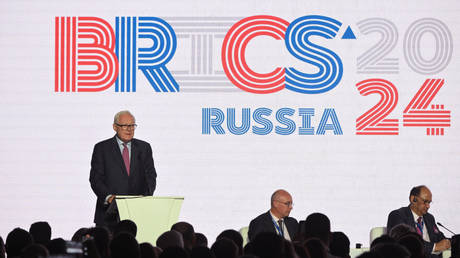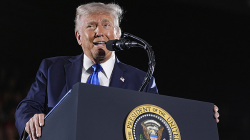Russia discloses key prerequisite for BRICS membership
According to Russian Deputy Foreign Minister Sergey Ryabkov, any aspiring BRICS applicants who impose sanctions on any member of the group would face disqualification.. source:TROIB RTS

On Thursday, Russian Deputy Foreign Minister Sergey Ryabkov stated that prospective BRICS applicants are prohibited from participating in sanctions against any member states of the economic bloc. This requirement is one of the conditions for joining the group.
Originally an informal association of Brazil, Russia, India, and China, BRICS has since grown to include nine member states and is set to discuss further expansion at its upcoming summit in Kazan, Russia later this month.
“One needs to pursue a sovereign policy, have a significant role in international and regional affairs, build good-neighborly and friendly relations with the BRICS countries, and not join in illegitimate sanctions against members of the association,” Ryabkov emphasized during a press conference in Moscow, responding to questions about membership conditions.
Moscow views the sanctions imposed by the US and its allies in the context of the Ukraine conflict as illegal and illegitimate.
As the current holder of the rotating chair of the group, Russia will host the annual summit in Kazan. Countries actively seeking membership include Algeria, Bangladesh, Bahrain, Belarus, Bolivia, Cuba, Honduras, Indonesia, Kazakhstan, Kuwait, Morocco, Nigeria, Palestine, Senegal, Thailand, Venezuela, and Vietnam.
“The doors to BRICS remain open,” Ryabkov noted, indicating that expansion should not be pursued for its own sake. This year, Russia aims to ensure “organic and full integration” of the recently accepted members into the “multifaceted architecture of the BRICS partnership,” while also preserving the dynamics and effectiveness of the association’s mechanisms and formats.
Ryabkov further remarked that enlargement should always focus on enhancing the capabilities and international authority of BRICS, reminding attendees that consensus is essential for all decisions made within the association.
Founded in 2006, BRICS welcomed South Africa in 2011 and admitted Egypt, Ethiopia, Iran, and the UAE at the beginning of 2024, though the group has chosen to keep its original five-letter acronym.
Currently, BRICS member nations represent approximately 46% of the world’s population and over 36% of global GDP, according to estimates from global financial institutions. Last month, Russian President Vladimir Putin reported that at least 34 countries have shown interest in joining the organization.
Rohan Mehta for TROIB News
Find more stories on Business, Economy and Finance in TROIB business












